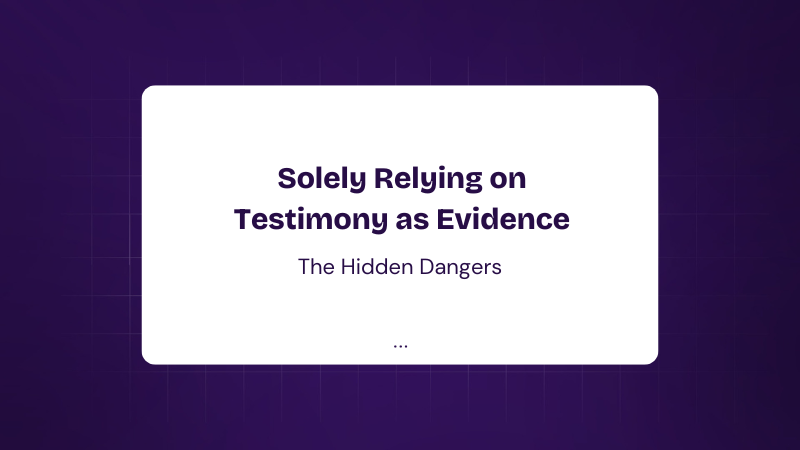“Trust, but verify.”
This old adage, often attributed to Ronald Reagan, is solid advice—especially when it comes to testimony in legal and investigative matters. While witness statements can be compelling, they are also riddled with biases, distortions, and, sometimes, outright falsehoods. Yet, courts and societies have long placed substantial weight on testimony.
But what happens when testimony is the only evidence? What are the risks of relying solely on someone’s words, memories, or perceptions? Well, buckle up, because we’re about to uncover the shocking, sometimes tragic, pitfalls of taking testimony at face value.
Memory is a Terrible Recorder
Wouldn’t it be great if our brains worked like high-definition cameras, recording everything with perfect accuracy? Unfortunately, human memory is more like a sketch artist with shaky hands—prone to distortions, gaps, and outright errors.
The Science of Faulty Memory
Studies have repeatedly shown that human memory is malleable and fallible. The renowned psychologist Elizabeth Loftus has conducted extensive research on false memories, showing how easily people can be led to “remember” events that never happened. In one study, participants were convinced they had seen a stop sign when there was actually a yield sign (Loftus, 2005).
Moreover, stress, trauma, and time delay can significantly alter recollections. Witnesses to crimes often misremember crucial details, and eyewitness misidentifications account for about 69% of wrongful convictions overturned by DNA evidence (Innocence Project).
If testimony is unreliable, why do we still use it as a primary form of evidence?
Bias and Subjectivity Contaminate Testimony
People don’t just remember incorrectly; they also perceive incorrectly. The way someone interprets an event depends on their background, beliefs, emotions, and even physical conditions.
How Bias Affects Testimony
Imagine two people witness the same car accident. One is a 70-year-old retiree; the other is a 25-year-old street racer. The retiree may recall the driver as “recklessly speeding,” while the racer might insist they were just “changing lanes aggressively.”
Studies have shown that racial and gender biases also play a role in testimonies. A 2018 study found that eyewitnesses are significantly more likely to misidentify people of a different race (Wells et al., 2018).
If biases color perception, how much weight should we give to testimonies that hinge on them?
The Power of Suggestion and Leading Questions
If you’ve ever played the childhood game of “Telephone,” you know how quickly a simple message can morph into something unrecognizable. In legal settings, the same thing happens—except the consequences are far worse.
How Leading Questions Manipulate Testimony
In courtroom cross-examinations, lawyers are trained to subtly (or not so subtly) guide witnesses toward desired answers. For example:
- Leading Question: “You saw the suspect holding a gun, didn’t you?”
- Neutral Question: “What did you see the suspect holding?”
Loftus’s research demonstrated that changing just one word in a question can alter a person’s memory of an event. In one experiment, when participants were asked how fast cars were going when they “smashed” into each other, they estimated higher speeds than those asked about when they “bumped” into each other (Loftus & Palmer, 1974).
This means that a witness’s memory isn’t just faulty—it can be deliberately reshaped by investigators, attorneys, or even the media.
Lies, Exaggerations, and Hidden Agendas
Let’s face it: people lie. Sometimes it’s to protect themselves, sometimes it’s to harm others, and sometimes it’s simply to gain attention or approval.
False Testimonies and Their Devastating Consequences
History is full of cases where false testimony led to catastrophic results. Consider the infamous Salem Witch Trials, where baseless accusations led to the execution of innocent people. Fast forward to modern times, and wrongful convictions due to false witness statements continue to plague the justice system.
One notorious example is the case of Curtis Flowers, a man who was tried six times for the same crime, largely based on unreliable and conflicting eyewitness testimonies. After 23 years in prison, his conviction was overturned by the U.S. Supreme Court in 2019 (AP News, 2019).
If testimony alone can send innocent people to prison, should it ever be considered sufficient evidence?
The Absence of Corroboration: A House of Cards
Testimony without supporting evidence is like a house of cards—unstable and prone to collapse under scrutiny. The strongest legal cases involve multiple types of evidence, including forensic analysis, video recordings, and physical proof.
Why Corroboration Matters
Imagine a murder trial where the only evidence is a neighbor claiming, “I saw him do it.” Without DNA, fingerprints, a weapon, or a confession, how reliable is that statement?
Legal experts emphasize that testimony should always be supported by independent verification. As forensic psychologist Saul Kassin puts it, “A confession without corroboration is just a story.” (Kassin, 2017).
If even confessions require corroboration, why should testimony stand alone?
FAQs
Can a person be convicted based solely on testimony?
Yes, but it’s controversial. Some convictions have been based solely on witness statements, but these cases are often prone to wrongful convictions.
How can we improve the reliability of testimony?
Using corroborative evidence, recording statements promptly, and avoiding leading questions can help improve accuracy.
What are some famous cases of wrongful conviction due to testimony?
The cases of Curtis Flowers, the Central Park Five, and Walter McMillian (the subject of Just Mercy) all involved unreliable witness testimony.
Are eyewitnesses more reliable than other types of testimony?
Not necessarily. Studies show that eyewitness memory is highly fallible, especially under stress.
What alternatives exist to relying on testimony?
Forensic evidence, video footage, electronic records, and DNA analysis provide more objective forms of evidence.
The Need for Caution and Critical Thinking
So, should testimony be completely discarded as evidence? Of course not. But relying on it solely is a dangerous gamble.
- Memory is unreliable
- Biases influence perception
- Testimonies can be manipulated
- False statements can destroy lives
- Lack of corroboration makes testimony weak
A robust justice system must demand multiple forms of evidence to ensure fairness. As the saying goes, extraordinary claims require extraordinary evidence.
And when it comes to testimony? A little skepticism might just save an innocent life.



